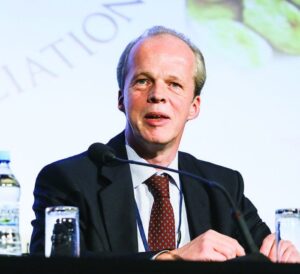The European Seed Association shares Its thoughts on the issues and forces shaping Europe’s seed industry.
The past 18 months have been like a ride on a high-speed roller coaster for Europe’s seed sector — at least as far as political and legislative developments are concerned. Many of these developments have either already seriously impacted the European Union’s seed sector or are expected to do so once final regulatory measures come into force.
A Bad Start
We’ll start with perhaps our greatest challenge. As you all well know, in early 2013 a large-scale ban was placed on key insecticide products for seed treatment: a group called neonicotinoids. Despite the joint lobbying effort of crop protection, seed treatment and seed companies backed by strong support from farmers and vegetable growers from all over Europe, the European Commission pushed through its controversial decision. With that, hundreds and thousands of seed businesses in Europe were put in a difficult spot from a legal, as well as a practical, operational perspective.
What about the existing stock of products? What about the inventory of seed already treated? Could they still be used within a sensible period of grace? Could they at least still be used for products that were exported? While neonicotinoid seed treatments are still considered the most modern, effective and sustainable way of combatting a number of key pests, Europe’s farmers and growers lost yet another technology from their toolbox for the foreseeable future.
Since the ban, much work has been done to develop new EU guidelines to be used in the assessment of crop protection products in view of bee safety, seed treatment assessments, examining the quality of treated seed and for the general review of many active substances. Unfortunately, together these developments seriously threaten Europe’s ability to efficiently and effectively respond to pest and disease pressures and to compete with competitors (and their products) from developing countries on a level playing field.
The European seed industry is addressing this point by the continuous roll-out and extension of its quality assurance scheme: European Seed Treatment Assurance (ESTA). Based on independent audit and certification, both treatment process and quality of final product are assured and documented through this agreement. More and more companies are coming under the scheme and we are convinced that ESTA has a key role to play in assuring availability of modern crop protection solutions in seed treatments.

Secretary-General
European Seed Association
A Modern New Seed Law for Europe?
Following a process lasting more than five years, the European Commission finally presented its proposals for a far-reaching general overhaul of the EU’s regulatory framework for seed marketing, plant and seed health and respective official controls in mid-2013. Already at the time of presentation, it seemed questionable whether the remaining few months in the term of the European Parliament, that was elected in spring 2014, would allow a first reading of all parts of the legislative package to be concluded.
This proved even truer, as in particular the seed marketing part of the file was quickly branded as (yet another) excessive attack of Brussels bureaucrats on private citizens and hobby gardeners. This piece of legislation, as it turns out, would further deteriorate efforts to preserve and utilise genetic resources in European plant breeding and practical agriculture. While both suppliers and users, i.e. breeders and farmers, jointly underlined the importance of high-quality seed and the need for the respective regulatory requirements — for a competitive agriculture environment, to address food security challenges, and to safeguard customer protection — it was mainly non-governmental organisations that called for a ‘liberalisation’ of the market. An odd situation that was often difficult to explain to decision-makers during the discussion process in Parliament.
However, the main problem of the proposal remained its successful discrediting by activists contending that it was as an anti-biodiversity and pro-industry law that would only benefit a handful of multinational companies. Given the upcoming European Parliament elections and a general policy and campaign trend to position oneself against further EU integration or harmonisation, it proved in the end impossible to penetrate this simplistic line of arguments of opponents in time. Just before its recess, the European Parliament decided to reject the proposal and called upon the Commission to present a new one as soon as possible.
When this will actually happen and how a new proposal could address the misperceptions of many groups and individual MEPs is still open at this time; but the subject will surely be decisive also for the overall positioning and perception of Europe’s seed sector vis-à-vis the new Commission and the new Parliament way beyond the actual scope of this concrete legislation.
To Access — Or Not to Access
An area where this clash of perceptions, and misperceptions, has become very obvious in the past months is the EU’s policy and rules on access to genetic resources. The EU very early set the formal implementation of the Nagoya protocol on access and benefit sharing for genetic resources as a top policy priority. The intention was to be among the first parties to formally set and implement all necessary provisions, and with that to contribute to the earliest possible entry into force of the protocol itself — with 50 countries required, the EU’s 28 Member States clearly can play a major role here.
While the plant breeding sector shared the principal political objectives of the proposed EU regulation, it quickly became obvious that the necessary sector-specific rules had not been considered properly by the Commission. The final Regulation therefore contains elements that are unacceptable for plant breeders. These are now subject to a legal challenge to the new law put forward to the European Court by two larger groups of individual companies. Most specifically, companies fear the exponential increase of documentation obligations and the related legal uncertainty. They also feel that the cornerstone of the European Union’s plant variety rights legislation, the “Breeders Exemption”, granting free access to commercially available varieties for further breeding, is seriously jeopardised.
Of course, the outcome of this legal challenge is not yet known; but fighting for the breeders exemption is included in the ‘raison d’être’ of ESA. And not least the introduction of this specific provision for plant breeding into the general EU Unitary Patent last year provides a marked example that despite all opponents and criticism, Europe’s plant breeders can mobilise political majorities in their favour.
With clear focus, a very high level of motivation and expertise and continuous outreach and advocacy, we have been able to convince both Member States and Members of Parliament of our specific needs and proposal. This is a good example to remember in view of the upcoming challenge of addressing a new European Parliament and a new Commission!
New Faces. Old Prejudices?
With an even more diverse and outright Eurosceptic European Parliament, gathering such political majorities will possibly be even more challenging than in the past. Many MEPs are new to European politics and many, many organisations will compete for their attention and support. But seed is exciting! It does trigger interest and discussion. It is generally considered important — by society, by politicians, by users and suppliers of seed alike.
Seed does not have an ‘attention problem’; we might not necessarily agree with views of those paying this close attention. But, we do have a product and related policies that are right at the centre of a general societal and political debate. Assuring that reasoned judgement takes over from some of the prejudices and accusations of the past is a tall order for our industry. Not least in view of the many challenges ahead; proposals for a review of the organic farming and novel food regulations are already out and discussed, the review of the plant health and seed legislation will continue, the debates on the re-nationalisation of authorisations of GMOs and on international trade rules will surely pick up momentum in the months to come.
ESA will be at the centre of all regulatory and technical discussion; but we will foremost try to be at the centre of the overall societal and political debate as well, together with our partners in the European and international agri-food chain.
Yes, we will — speak up for seeds!














